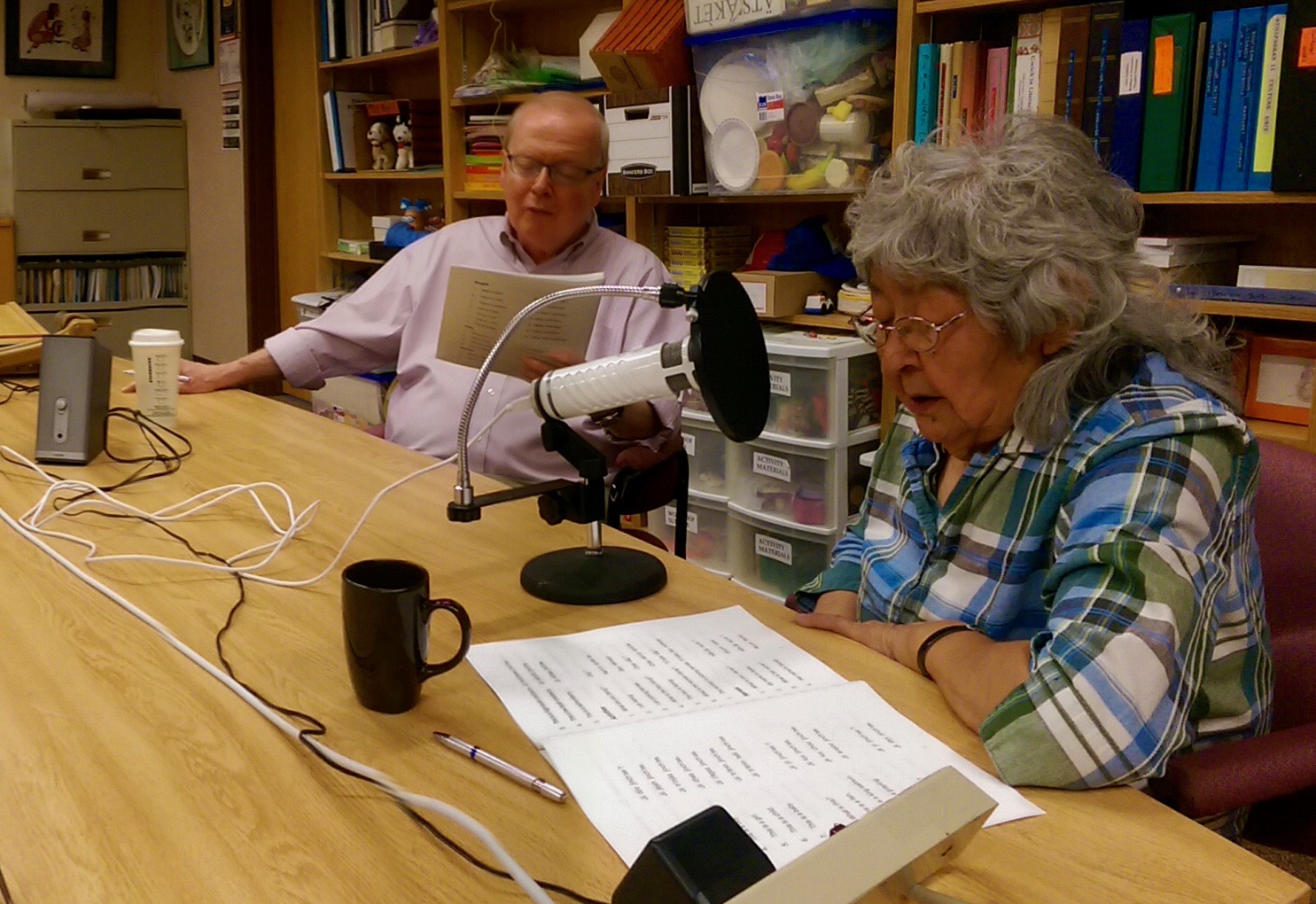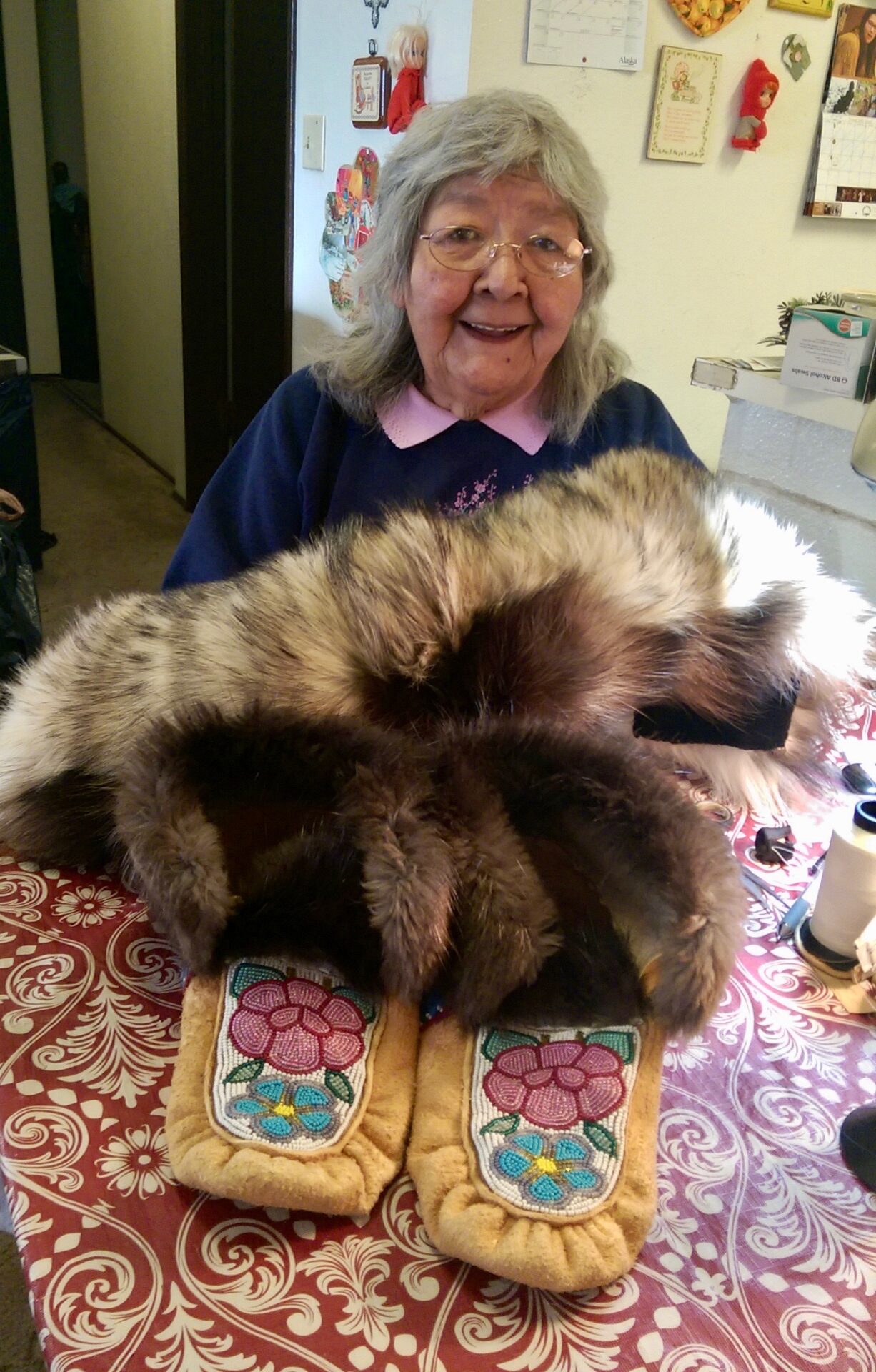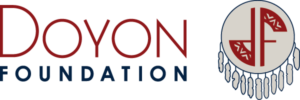Continuing a lifetime of language work

Ruth recording lessons with John Ritter at the Yukon Native Language Centre
As Doyon Foundation continues to grow our language revitalization efforts in the Doyon region, we are noticing a group of people who are committed and dedicating their own time to learning and perpetuating their ancestral language. We are pleased to share some of these “Language Champion” profiles with you. If you know a language champion, please nominate him or her by contacting our language program director at [email protected]. Language champions may also complete our profile questionnaire here. You may learn more about our language revitalization program on our website.
Ruth Ridley is a fluent speaker of the Eagle, Alaska, dialect of the Hän Athabascan language. She has been a language champion for many years, following in the footsteps of her late mother Louise Paul. Ruth’s lifetime work of transcribing and translating Hän language began when she was a child. “I started off doing transcriptions for Hän language that mom recorded with John Ritter (of the Yukon Native Language Centre),” she explains.

Ruth at home with sewing projects
Ruth was brought up by her parents Louise and Susie Paul in a mining camp just downriver from Eagle. “We grew up in Coal Creek mining camp. Our families lived there, summer and winter,” Ruth shares. “My mom’s parents were Eliza and Joe Malcolm in Eagle, and my dad’s parents were Elizabeth and Paul Josie in Old Crow.” Ruth has many good memories of growing up in the Eagle area. “There are creeks with grayling, and beaver ponds, and lots of porcupine, and lots of moose, caribou, and a lot of grizzly bear,” she says.
Ruth sometimes spent all summer with her grandparents. “We would go to fish camp with my grandma and grandpa and they spoke Loucheux or Gwich’in. My grandma didn’t speak English, so we had to speak to her in Hän, and then she would talk back to us in Gwich’in. So that’s how we learned too,” Ruth recalls.
Over the years, Ruth has maintained language connections with her Hän and Gwich’in-speaking relatives in Canada, attending workshops in both Dawson City and at the Yukon Native Language Centre (YNLC) at Yukon College, Whitehorse. “My dad’s sister was Edith Josie, who did lot of language work in Old Crow,” Ruth says.
Ruth has been involved in Hän language work since the late 1970s when she collaborated with professor Michael Krauss at the University of Alaska Fairbanks (UAF) to develop the first practical writing system for the language. She composed a collection of stories in Hän based on traditional village life, Eagle Hän Huchʼinn Hòdök, published in bilingual format by the Alaska Native Language Center in 1983. Also in that year, she served as Alaska chair of an important Athabaskan language conference held at UAF, a gathering that attracted participants from throughout Canada and the United States. She also served as principal speaker in a three-week Hän practicum offered as a part of CoLang 2016 at UAF.
Recently (2015-2016) Ruth has been a Hän language consultant for Doyon Foundation, working with YNLC linguist John Ritter to record and transcribe a set of basic Hän language lessons. These lessons will be shared first as a booklet with accompanying audio, and later posted on the internet as part of the Doyon Languages Online project, a partnership of Doyon Foundation and 7,000 Languages.
On the importance of creating language lessons such as these, Ruth shared, “I think it would be easier to speak in sentences than just one word at a time. And that way kids can look at the words and they could pronounce it, like my grandchildren they say they’re hungry and they’re thirsty in Hän.”
Ruth feels language is important because “you could really find out about your culture and the kind of person you are, if you could understand and speak your language. I think it’s important that people learn where they come from and where they are going.”
Ruth is looking forward to sharing these lessons with learners. “I guess the biggest challenge is to get started and get going in the right direction,” she remarks. “If they could get started with these lessons then they’ll know which way they’re supposed to go.”
Ruth is also curious about the next steps of posting the lessons online through the Doyon Languages Online project. “I’m just waiting for them to get on the internet to see how people like the language, or how useful they would be for teaching themselves on the computer,” she says.
According to the Alaska Native Language Center, “Hän is the Athabascan language spoken in Alaska at the village of Eagle and in Yukon Territory at Dawson. A writing system was established in the 1970s, and considerable documentation has been carried out at the Alaska Native Language Center as well as at the Yukon Native Language Centre in Whitehorse.”
For more information about how to get copies of Ruth’s Hän language lessons, or to learn more about the Doyon Languages Online project, please contact Allan Hayton at 907.459.2162 or [email protected].

Very interesting. Hopefully she is able to pass on some of that language and culture to her children and grandchildren. Ruth is my son’s mother-in-law, so her grandchildren are my grandchildren too.